中考英语人教版一轮复习导学案 第二讲 七年级(上)Units 6~9
七年级英语上册Unit6复习导学案新版人教新目标版6

Unit 6 Do you like bananas?【复习目标】1. 熟练掌握本单元的重点词汇和短语。
2. 熟练掌握本单元的重难点。
【学习过程】Step 1: 词汇听写Step 2: 重难点集训1.well与good辨析★well用作副词,常置于动词之后,表示程度“好;满意地”;也可用作形容词,指“身体好”。
如:The boy can swim very well.这个男孩游泳游得很好。
★good是形容词,常置于名词之前作定语,指人的品质或物品的质量好,也可用于系动词后作表语。
如:Mr.Wang is a good teacher.王老师是一位好老师。
学以致用Ⅰ.单项选择。
( )1.—Do they eat ________ at school every day?—Yes,they do.A.good B.nice C.fine D.well( )2.—Your English is________.—Thank you.A.good B.well C.bad D.OK( )3.Susan is a ________ student and she does ________ at school.A.well;good B.good;good C.well;well D.good;wel lⅡ.用good或well填空。
4.—Does h is friend play football_________?—No,he doesn't.5.—Let's play volleyball after class.—That sounds _________.6.—Is this a_________ book?—Yes,it is.7.—How is your father?—He is _________.Thank you.2.chicken的用法★chicken作名词,意为“鸡肉”,此时为不可数名词;意为“小鸡”时,是可数名词,复数形式为chickens。
2015年中考英语(人教版·陕西)考点精讲 第2讲 七年级(上)Units 6-9
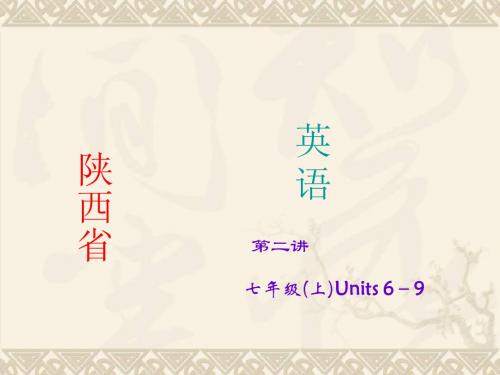
• 17.from... ___... 从„„到„„
• 1.—___________ Do you like salad?你喜欢沙拉吗? do ./No,I don't • —Yes,I ____ ______.是的,我喜欢。/不,我 不喜欢。 doesn't like vegetables .他不喜欢蔬菜。 • 2.He ___________________ How much is • 3.—________________ the hat?这顶帽子多少钱?
• —It's five dollars.5美元。 When • 4.—_______ is your birthday?你的生日是什么时候? on • —My birthday is ___May 2nd.我的生日是5月2日。
• 5.____ What breakfast ?你早餐喜 欢吃什么? ant to be fat .我不想变胖。 • 6.I don't w ____________ you are .给你。 • 7.Here ___________ I help • 8.—Can _________you ?我能帮你吗? please • —Yes,______.好的,谢谢。 For in • 9 . _____girls , we have skirts for ____purple
_____only $20.对于女孩,我们有紫色的裙子仅售
20美元。
• 10.I'll _____it. 我买下了。 take favorite subject?你最喜欢的学科是 • 11.—What's _______ your ________ 什么?
• —My favorite subject is P.E.我最喜欢体育。 Why • —______do you like P.E.?你为什么喜欢体育?
人教版中考英语一轮复习复习学案七年级上册Units5-9
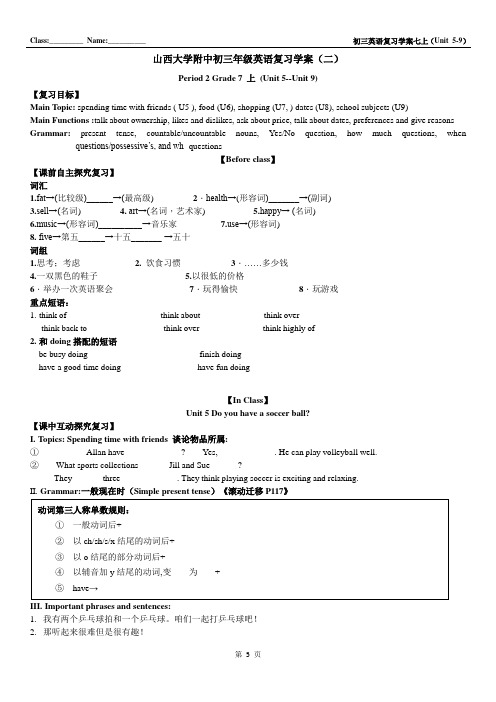
山西大学附中初三年级英语复习学案(二)Period 2 Grade 7 上(Unit 5--Unit 9)【复习目标】Main Topic: spending time with friends ( U5 ), food (U6), shopping (U7, ) dates (U8), school subjects (U9)Main Functions :talk about ownership, likes and dislikes, ask about price, talk about dates, preferences and give reasons Grammar:present tense, countable/uncountable nouns, Yes/No question, how much questions, when questions/possessive’s, and wh- questions【Before class】【课前自主探究复习】词汇1.fat→(比较级)______→(最高级)_______ 2.health→(形容词)_______→(副词)________3.sell→(名词)_______4. art→(名词,艺术家)_________5.happy→ (名词)_______6.music→(形容词)__________→音乐家________e→(形容词)______8. five→第五______→十五_______ →五十_______词组1.思考;考虑___________2. 饮食习惯___________ 3.……多少钱_________4.一双黑色的鞋子__________________5.以很低的价格______________6.举办一次英语聚会________________ 7.玩得愉快______________8.玩游戏___________重点短语:1.think of _______ think about _______ think over _______think back to _______ think over _______ think highly of _______2.和doing搭配的短语be busy doing _______ finish doing _______have a good time doing _______ have fun doing _______【In Class】Unit 5 Do you have a soccer ball?【课中互动探究复习】I.Topics: Spending time with friends 谈论物品所属:①--- ______ Allan have ______ ______? ---Yes, ______ ______. He can play volleyball well.②---What sports collections ______ Jill and Sue ______?---They ______ three ______ ______. They think playing soccer is exciting and relaxing.II.Grammar:一般现在时(Simple present tense)《滚动迁移P117》动词第三人称单数规则:①一般动词后+_____②以ch/sh/s/x结尾的动词后+_____③以o结尾的部分动词后+_____④以辅音加y结尾的动词,变____为____+_____⑤have→_____III.Important phrases and sentences:1.我有两个乒乓球拍和一个乒乓球。
2024年人教版重庆中考英语一轮教材复习课件+七年级上册+Units+5~9

基数词 fifteen eighteen twenty thirty
序数词
16._f_i_ft_e_e_n_t_h___ 17.__e_ig_h__te_e_n_t_h__ 18._t_w__e_n_ti_e_t_h__ 19._t_h_i_r_t_ie_t_h___
Unit 8
1.happy adj.愉快的;高兴的→ adv.__h_a_p_p_i_ly__ n.__h_a_p_p_in__es_s__【2021A·40】 反义词 __u_n_h_a_p_p_y_
10.price n.价格 搭配: __a_t_ a high price 价格昂贵 _a_t__ a low price 价格低廉
基数词 ten
eleven twelve thirteen fourteen
序数词
11._t_e_n_t_h__ 12. __e_le_v_e_n_t_h__ 13. __tw__e_lf_t_h__ 14. _t_h_i_r_t_e_e_n_th___ 15. _f_o_u_r_t_e_e_n_t_h__
比较级 _b_i_g_g_e_r_ 最高级 _b_i_g_g_e_s_t 反义词 __sm__a_l_l _( 小的;小号的)
3.short adj.短的;矮的→
比较级 _s_h_o_r_t_e_r_____ 最高级 __sh__o_rt_e_s_t____ 反义词 __lo_n_g_/_t_a_ll____
情 景 串记 Jack is a good player. He also likes to play chess and play the piano. In
his free time, he likes to play with his friends. In school, he plays a part in the school drama club. He enjoys playing different characters.
2021年中考英语(人教版)一轮复习 教材梳理 第2课时 七年级(上)Units5_9 课件
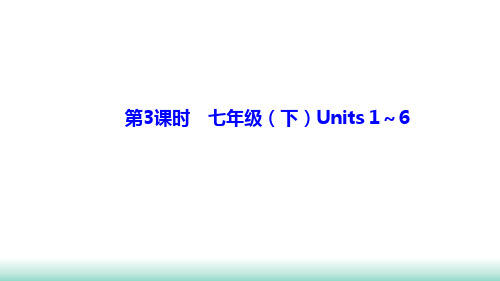
B)根据句意,用括号中所给单词的适当形式填空。 6.His mother is reading a story to her _c_h_i_ld__re_n_____(child).They like it very much. 7.He watches TV in the____l_iv_i_n_g_____ (live) room. 8.Look!The man is _____c_u_t_ti_n_g_____(cut) down the tree. 9.We like Mr. Zhang because he is ____f_r_ie_n_d_l_y____(friend) to us. 10.Lily is our English teacher.She ____t_e_a_c_h_e_s___(teach) us English.
【考点抢测】 3.By the time she was eight, Linda __A__ read English and French.(2020·南 京) A.could B.must C.need D.may 4.—__C__ you please take the dog for a walk? —OK, but I have to fold the clothes first.(2020·十堰) A.Must B.Should C.Could D.May
A.sleeps B.is sleeping
C.sleep
一、词汇运用。 A)根据句意及汉语提示写单词。 1.Don't ____fi_g_h_t____(打架) with your friends. 2.—What time is it? —Oh,it's a ___q__u_a_r_te_r______(四分之一) past six. 3.My home is___n_in__et_y_______ (九十) miles away from school. 4.His _f_a_t_h_e_r_d_r_i_v_e_s__(开车) his car to work every day. 5.I am not ____a_f_ra_i_d_____(害怕) to go to school by bike.
人教版中考英语一轮复习第二讲七年级(上)Units6-9说课稿

人教版中考英语一轮复习第二讲七年级(上)Units 6-9说课稿一. 教材分析人教版中考英语一轮复习第二讲七年级(上)Units 6-9主要包括了四个单元,分别是Unit 6 Thanksgiving in the United States,Unit 7 On the farm,Unit 8 My birthday,Unit 9 The weather is changing。
这四个单元的主题涵盖了西方传统节日、农场生活、生日庆祝以及气候变化等。
这些内容旨在通过真实情境的呈现,让学生在掌握语言知识的同时,增强跨文化交际意识,提高英语运用能力。
二. 学情分析面对七年级的学生,他们在经过一个学期的英语学习后,已经具备了一定的英语基础。
学生们对英语学习充满热情,但同时也存在一些问题。
比如,部分学生在口语表达方面较为薄弱,有些学生对语法知识掌握不扎实。
因此,在教学过程中需要关注学生的个体差异,因材施教,充分调动学生的积极性。
三. 说教学目标根据新课程标准,本节课的教学目标为:1. 学生能掌握 Units 6-9 的主要知识点,包括词汇、语法、功能句型等;2. 学生能在真实情境中运用所学知识进行交际;3. 学生能提高跨文化交际意识,增强英语运用能力;4. 学生能培养良好的学习习惯,提高自主学习能力。
四. 说教学重难点本节课的重难点主要包括:1. 词汇的学习和运用,特别是与节日、农场、生日、天气等相关词汇;2. 语法知识的掌握,如一般现在时、一般过去时等时态的运用;3. 功能句型的运用,如询问节日、描述生日庆祝、谈论天气变化等场景的交际用语。
五. 说教学方法与手段为了提高教学效果,本节课将采用任务型教学法、情境教学法和合作学习法等多种教学方法。
通过设定真实情境,引导学生参与各种交际活动,提高他们的英语运用能力。
同时,利用多媒体教学手段,如图片、视频等,丰富教学内容,激发学生的学习兴趣。
六. 说教学过程1.导入:以一首关于季节变化的英语歌曲引入话题,激发学生的学习兴趣。
2024年人教版中考英语一轮复习课件++第2讲+七年级上册Units+4~6

知识建构 要点梳理 考点聚焦 备考练习
19
第2讲 Units 4~6
复习讲义
考点精练
知识建构 要点梳理 考点聚焦 备考练习
复习讲义
9
第2讲 Units 4~6
Unit 5
4.—Do you have a ping-pong bat?
—Yes, I do. (P25)
——你有乒乓球拍吗?
——是的,我有。
5.—Do you have a ping-pong ball?
—No, I don’t. (P25)
容词性物主代词)
3.they pron. 他们→ __th_e_m__ pron. 他们 (宾格)
4.do v. 做;干→ _d_o_e_s_ v. 做;干 (第三人称单数形式)
5.have v. 有→ _h_a_s_ v. 有 (第三人称单数形式)
6.interesting adj. 有趣的 (形容事物)→ _i_n_te_r_e_st_e_d_ adj. 感兴趣的
考点精练
1.A computer is __o_n_ (在……上) the table. 2.A white eraser is _u_n_d_e_r_ (在……下) his chair.
知识建构 要点梳理 考点聚焦 备考练习
复习讲义
15
第2讲 Units 4~6
复习讲义
考点2 并列连词and和but。
fish sheep Chinese deer Japanese
(完整版)(人教版)中考英语一轮复习(第2讲)七年级(上)Units6~9修改

第二讲七年级(上)Units 6~9重点词汇1.tomato(n.)西红柿2.bread(n.)面包3.vegetable(n.)蔬菜4.dinner(n.)(中午或晚上吃的)正餐5.chicken(n.)鸡肉6.habit(n.)习惯7.question(n.)问题8.want(v.)想要;需要9.sweater(n.)毛衣10.small(adj.)小的;小号的11.sell(v.)出售;销售;卖12.twentieth(num.)第二十13.August(n.)八月14.fifth(num.)第五15.festival(n.)节日16.music(n.)音乐17.subject(n.)科目18.geography(n.)地理19.Wednesday(n.)星期三20.finish(v.)完成词汇拓展1.fat→(比较级)fatter→(最高级)fattest2.health→(形容词)healthy→(副词)healthily3.sell→(名词)sale4.art→(名词,艺术家)artist5.happy→(反义词)unhappy→(名词)happiness6.music→(形容词)musical→音乐家musician7.use→(形容词)useful8.five→第五fifth→十五fifteen→五十fifty 重点短语1.思考;考虑think about2.饮食习惯eating habits3.……多少钱how much4.一双黑色的鞋子a pair of black shoes5.以很低的价格at very good prices6.举办一次英语聚会have an English party7.玩得愉快have a good time8.玩游戏play games 重点句型1.—Do youlike salad?你喜欢沙拉吗?—Yes,I do/No,I don't.是的,我喜欢。
初中英语中考复习 中考英语(人教新课标)一轮复习教案:七年级上册Unit 7--9

第3课时课题:7年级上册 (U7+U9)一、学习目标:1. 能识记表“衣物”、“月份”、“星期”、“学科”等方面的名词;序数词;11个常用形容词及want 等常用词汇。
2. 能熟练运用所学语言谈论“物价”、“日期”、“个人喜好”、“陈述理由”及“学科”等生活话题。
3. 能理解基数词与序数词的用法区别、英语日期的表达方式、名词所有格的表达、特殊疑问句句式、连词and 与but 的用法。
二、重点:1.特殊疑问句句式及其运用; 2. 可数名词与不可数名词的运用。
三、难点:1. 特殊疑问句句式及其运用;2. 基数词与序数词的用法区别; 四、知识梳理:(一)词汇 1. 衣物: clothesshoe sweater T-shirt sock shorts hattrousersjacket 鞋毛衣T-恤袜子短裤帽子 长裤夹克2. 月份:monthJanuary F ebruary March April May June 一月二月 三月 四月 五月 六月 July August September October November December 七月 八月九月十月十一月十二月weekdayweekendMonday Tuesday Wednesday Thursday Friday Saturday Sunday 星期一星期二星期三星期四星期五 星期六星期日中考一轮复习教学参考资料4. 学科:subject science music math English Chinese history 科学音乐数学英语中文历史physics geography PE art chemistry物理地理体育艺术化学5. 数词:个位数-th 十几-th 整十-eth 其他基数词序数词基数词序数词基数词序数词基数词序数词0 /10 tenth / / 21 21st1 first 11 eleventh / / 32 32nd2 second 12 twelfth 20 twent ieth43 43rd3 third 13 thirteenth 30 thirt ieth55 55th4 fourth 14 fourteenth 40 Fortieth 68 68th5 fifth 15 fifteenth 50 Fiftieth 99 99th6 sixth 16 sixteenth 60 Sixtieth 100 100th7 seventh 17 seventee nth 70 seventieth 1001 1001st8 eighth 18 eighteenth 80 eightieth 1002 1002nd9 ninth 19 nineteenth 90 ninetieth 1003 1003rd①基数词表示数量多少。
七年级上册英语Unit6复习课导学案
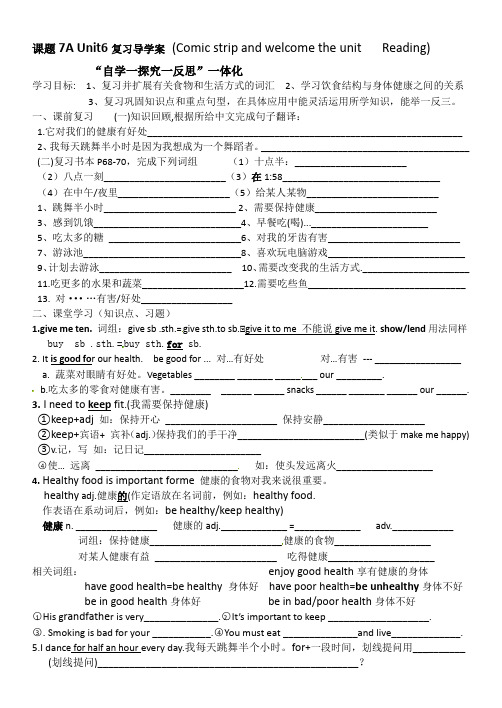
课题7A Unit6复习导学案(Comic strip and welcome the unit Reading)“自学一探究一反思”一体化学习目标: 1、复习并扩展有关食物和生活方式的词汇2、学习饮食结构与身体健康之间的关系3、复习巩固知识点和重点句型,在具体应用中能灵活运用所学知识,能举一反三。
一、课前复习(一)知识回顾,根据所给中文完成句子翻译:1.它对我们的健康有好处______________________________________________________________2、我每天跳舞半小时是因为我想成为一个舞蹈者。
_________________________________________(二)复习书本P68-70,完成下列词组(1)十点半:______________________(2)八点一刻________________________(3)在1:58_______________________________(4)在中午/夜里______________________(5)给某人某物__________________________1、跳舞半小时__________________________2、需要保持健康________________________3、感到饥饿_____________________________4、早餐吃(喝)..._______________________5、吃太多的糖__________________________6、对我的牙齿有害__________________________7、游泳池_______________________________8、喜欢玩电脑游戏___________________________9、计划去游泳__________________________ 10、需要改变我的生活方式._____________________ 11.吃更多的水果和蔬菜____________________12.需要吃些鱼_______________________________13. 对···…有害/好处__________________二、课堂学习(知识点、习题)1.give me ten.词组:give sb .sth.=give sth.to sb.★give it to me 不能说give me it. show/lend用法同样buy sb .sth.=buy sth.for sb.2. It is good fo r our health. be good for ... 对…有好处对…有害--- _________________a. 蔬菜对眼睛有好处。
七年级英语上下册九年级英语第一轮复习导学案(全册)
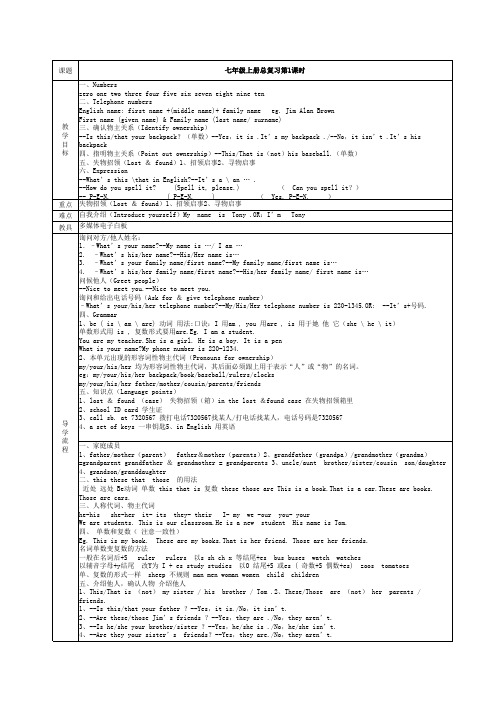
答案第1课时(Section A 1a-3c)课堂基础练习1.C remember to do表示记住去做某事,这个动作在说话的时候还没做。
remember doing sth.表示已做过某事,说话的时候动作已完成。
由句意“记住放学后要去邮局。
”可知说话时此事还没做,故选C。
2.B 由句意“难道你不记得两年前见过我了吗?”可知动作已完成。
故选B。
3.has doubled 4.double 5.keep our cool6.cool clothes 7.put in more effort课后巩固提升一、1.double 2.mess 3.survey 4.standard5.instructions二、1.go 2.bringing 3.ours 4.double 5.cooler三、1.C prepare for为……做准备。
2.A because of 后接名词或名词性短语,故选A。
3.B take a break from doing sth.意为“在做某事期间休息”,故选B。
4.C take the time to do sth.意为“花费时间去做某事”,故选C。
5.D 根据语境可知表示“你将最思念谁”应用much的最高级,故选D。
6.A 句意:我记得已经打扫了教室,但是教室现在很混乱。
表示“记得做过某事”应用remember doing sth.的结构,故选A。
7.A be the pride of是……的骄傲, be proud of=take pride in以……为骄傲, 故选A。
8.A put in more effect 意为“投入更多的精力”,又因为此词组与前面的word hard 为并列成分,故选A。
9.A in a row 既有“连续几次”之意,也有“在一排;在一列”之意。
句意:学生们手拉手站成一排。
故选A。
10.B 句意:我相信你能自己算出这道难题。
work out 意为“算出来;解决”,故选B。
人教版中考英语一轮复习第二讲 七年级(上)Units 6-9教学设计

人教版中考英语一轮复习第二讲七年级(上)Units 6-9教学设计一. 教材分析人教版中考英语一轮复习第二讲主要涉及七年级(上)Units 6-9的内容。
这部分教材主要围绕日常生活中的常见场景展开,包括家庭成员、外貌描述、询问时间、地点等。
通过这部分的学习,学生能够进一步掌握日常英语交流的基本句型和词汇。
二. 学情分析七年级的学生已经初步掌握了英语的基本语法和词汇,但对于一些复杂的句型和表达方式还不够熟练。
此外,学生的英语听说能力相对较弱,需要通过大量的练习来提高。
在 Units 6-9 的学习中,学生需要掌握家庭成员的称呼、外貌描述、时间地点的询问等交际用语,这对于他们来说是一个挑战。
三. 教学目标1.知识目标:学生能够熟练掌握 Units 6-9 中的核心词汇和句型,如家庭成员的称呼、外貌描述、时间地点的询问等。
2.能力目标:学生能够在实际情景中运用所学知识进行日常英语交流,提高听、说、读、写的综合能力。
3.情感目标:通过小组合作和互动交流,培养学生的团队合作意识和积极的学习态度。
四. 教学重难点1.重点: Units 6-9 中的核心词汇和句型。
2.难点:家庭成员的称呼、外貌描述、时间地点的询问等交际用语的运用。
五. 教学方法采用任务型教学法,通过设定各种实际情境,让学生在完成任务的过程中运用所学知识。
同时,运用分组合作、互动交流等方法,提高学生的参与度和积极性。
六. 教学准备1.教师准备:提前准备 Units 6-9 的教学材料,包括PPT、词汇卡片、练习题等。
2.学生准备:预习 Units 6-9 的内容,复习已学过的词汇和句型。
七. 教学过程1.导入(5分钟)通过提问方式复习已学过的内容,如询问学生家庭成员、外貌特征等,引出本节课的主题。
2.呈现(10分钟)利用PPT展示 Units 6-9 的核心词汇和句型,如家庭成员的称呼、外貌描述、时间地点的询问等。
同时,用图片或实物展示相关场景,帮助学生更好地理解和记忆。
精选-中考英语一轮复习第2课时七上Units6_9课件
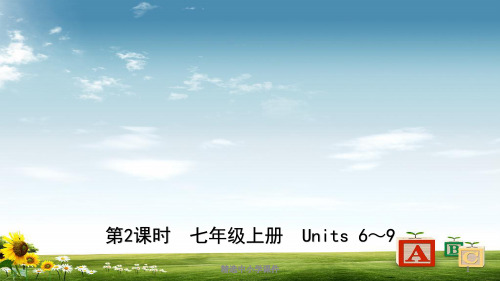
精选中小学课件
11
(3)其他的how词组
精选中小学课件
12
4.(2018·江苏扬州中考)— does Joanna take the
course in DIY?
—Every Saturday afternoon.
A.How long
B.How much
C.How soon
D.How often
精选中小学课件
精选中小学课件
19
考点五 need的用法 【课文原句】 I need a sweater for school. 我需要一件上学穿的毛衣。(七上P38)
精选中小学课件
20
need的两种词性
精选中小学课件
21
We need some color pencils for this afternoon's English class. 今天下午的英语课我们需要一些彩色铅笔。(实义动词) My watch needs repairing.=My watch needs to be repaired. 我的手表需要被修理。(实义动词) She need get enough food. 她需要得到足够的食物。(情态动词)
精选中小学课件
10
(2)how much还可对不可数名词的数量进行提问。
提问可数名词的数量要用how many。
How much water do you need?
你需要多少水?
—How many students are there in your class?
你们班有多少名学生?
—Thirty-six.36名。
精选中小学课件
17
(2)woman与man作定语修饰可数名词复数时要用复数 形式women和men。 There are two women nurses and three men doctors in the room. 房间里有两名女护士和三名男医生。
中考英语一轮复习 七上 Units6-9 导学案及答案

2020中考英语人教七上U6—9导学案一、复习。
(词汇拓展)(该部分单词主要为动词、名词或形容词等的变形,常在单项填空、完形填空和短文填空题型中进行考查,标★单词的变形尤其要重点掌握。
)1. interest n.& v.兴趣,趣味;使感兴趣→ ____________adj.有趣的★→____________adj.感兴趣的2. use n.& v.使用→ ____________adj.有用的;有益的★→ ____________adj.无用的;无价值的3. tomato n.西红柿→ ____________(pl.)4. health n.健康→ ____________adj.健康的★→ ____________adv.健康地5. go v.去;走→__________(第三人称单数)★→__________(过去式)→____________(过去分词)6. get v.去取(或带来);得到→ ____________(现在分词)→ ____________(过去式)→____________(过去分词) ★7. bore v.使烦扰→ ______adj.厌倦的;烦闷的→ ____________adj.没趣的;令人厌倦的★8. relax v.放松;休息→ ____________adj.放松的;冷静的;镇定的★ →____________adj.令人放松的;轻松的9. eat v.吃→ ____________(过去式)★→ ____________(过去分词)10. take v.买下;拿;取→ ____________(过去式)★→____________(过去分词)11. buy v.购买;买→ ____________(过去式/过去分词)12. sell v.出售;销售;卖→ ____________(过去式/过去分词)→____________n.特价销售;出售13. difficult adj.困难的→____________n.困难;难题★→____________(反义词) 容易的14. busy adj.忙碌的;无暇的→ ____________adv.忙碌地→ ____________n.生意;商业15. two num.二→ ____________num.第二16. three num.三→ ____________nu m.第三17. five num.五→ ____________num.第五18. nine num.九→____________num.第九19. twelve num.十二→ ____________num.第十二参考答案:1. interesting; interested2. useful; useless3. tomatoes4. healthy; healthily5. goes; went; gone6. getting; got; got/gotten7. bored; boring8. relaxed; relaxing9. ate; eaten 10. took; taken11. bought12. sold; sale13. difficulty; easy14. busily; business15. second16. third17. fifth18. ninth19. twelfth二、重点单词考点1want的用法I don’t want to be fat.我不想变胖。
2021年春人教版英语中考复习课件 2 七年级(上) Units 6~9

根据句意用适当的介词填空。 20.(2021·山东枣庄预测)Most people like buying things ___fr_o_m___ the supermarket. It’s quite convenient. 21.(2021·山东枣庄预测)They will put all these secondhand goods up ___f_o_r___ sale. 22.(2021·山东枣庄预测)Last year, he sold a computer ____to____ me but it doesn’t work now.
【考点例句】 He is a good boy.他是一个好男孩。 Tom speaks good Chinese.= Tom speaks Chinese well.汤姆中文讲得好。 —How are you?你怎么样? —Fine, thanks.我很好,谢谢。 If it’s fine tomorrow, we will go out.如果明天天气晴朗,我们就出门。 They’ve got a very nice house.他们的房子真漂亮。 She is nice to others.她待人友善。 I don’t feel very well.我身体不是很舒服。
根据句意从括号内选择适当的词填空。 9.Look at this red coat. It’s really e_x_p_e_n_s_iv_e_.(expensive/high) —Yeah, I can’t afford it. The price is too __h_i_g_h___.(expensive/high) 10.The prices of the houses at the moment are still very ___h_ig_h___.(expensive/high) 11.(2021·山东枣庄原创)The piano is too e_x_p_e_n_s_i_v_e(expensive/high) for me to afford.
中考英语(人教新目标)一轮复习方案第一部分 第2课时 七年级上册 Unit 5~Unit 9

第2课时七年级上册Unit 5~Unit 9单元话题语法链接Unit 5Spending time with friends (与朋友共度时光)Unit 6Food (食物)Unit 7Shopping (购物)Unit 8Dates (日期)Unit 9School subjects (学校科目)1.一般现在时(P163)2.可数名词与不可数名词(P127~128)3.特殊疑问句(P173)4.基数词与序数词(P139~140)5.时间介词in, on, at (P142)基础自查【核心单词】1.do (aux v.& v.) 用于构成否定句和疑问句;做;干→does (第三人称单数)→did (过去式)→done (过去分词)2.have (v.) 有→has (第三人称单数)→had (过去式/过去分词)3.let (v.) 允许;让→let (过去式/过去分词)→ letting (现在分词)4.go (v.) 去;走→goes (第三人称单数)→went (过去式)→gone (过去分词) 5.get (v.) 去取(或带来);得到→gets (第三人称单数)→got (过去式)→gotten (过去分词)→getting (现在分词)6.play (v.) 参加(比赛或运动);玩耍→plays (第三人称单数)→played (过去式/过去分词)→player (n.) 运动员;参赛选手7.interesting (adj.) 有趣的→interested (adj.) 感兴趣的→interest (n.) 兴趣(v.)使感兴趣8.boring (adj.) 没趣的;令人厌倦的→bored (adj.) 厌倦的;烦闷的→bore (v.) 使厌烦9.fun (adj.) 有趣的;使人快乐的(n.)乐趣;快乐→funny (adj.) 有趣的;滑稽的;奇怪的10.difficult (adj.) 困难的→difficulty (n.) 困难;难题11.relaxing (adj.) 轻松的;令人放松的→relaxed (adj.) 轻松自在的;放松的→relax (v.) 放松;休息12.watch (v.) 注视;观看→watches (第三人称单数)→watched (过去式/过去分词)13.love (v.& n.) 爱;喜爱→lovely (adj.) 可爱的14.easy (adj.) 容易的;不费力的→easily (ad v.) 容易地→easier (比较级)→easiest (最高级)15.tomato (n.) 西红柿→tomatoes (pl.)16.eat (v.) 吃→ate (过去式)→eaten (过去分词)17.well (ad v.) 好;令人满意地→better (比较级)较好地;更好地→best (最高级)最好地18.healthy (adj.) 健康的→health (n.) 健康→healthily (ad v.) 健康地19.really (ad v.) 真正地→real (adj.) 真的;真正的20.fat (adj.) 肥的;肥胖的(n.) 脂肪;肥肉→fatter (比较级) 较胖的→fattest (最高级) 最胖的21.much (pron.& adj.) 许多;大量;多少→more (比较级)更多→most (最高级)最多22.shoe (n.) 鞋→shoes (pl.)23.big (adj.) 大的;大号的→bigger (比较级)更大的→biggest (最高级)最大的→small (反义词)小的;小号的24.long (adj.) 长的→length (n.) 长;长度25.woman (n.) 女子→women (pl.)26.take (v.) 买下;拿;取→took (过去式)→taken (过去分词)→bring (反义词) (v.) 带来;取来27.buy (v.) 购买;买→bought (过去式/过去分词)28.sell (v.) 出售;销售;卖→sold (过去式/过去分词)→sale (n.) 特价销售;出售29.happy (adj.) 愉快的;高兴的→happily (ad v.) 快乐地;高兴地;满足地→happiness (n.) 幸福→unhappy (反义词) (adj.) 不快乐的;难过的;悲伤的30.art (n.) 艺术;美术→artist (n.) 艺术家31.busy (adj.) 忙碌的;无暇的→busily (ad v.) 忙碌地→business (n.) 生意;商业32.science (n.) 科学→scientist (n.) 科学家→scientific (adj.) 科学(上)的;关于科学的33.music (n.) 音乐;乐曲→musical (adj.) 音乐的;配乐的→musician (n.) 音乐家【背记单词】食物1.banana (n.) 香蕉2.hamburger (n.) 汉堡包3.strawberry (n.) 草莓4.pear (n.) 梨5.milk (n.) 牛奶6.bread (n.) 面包7.dinner (n.) (中午或晚上吃的)正餐8.food (n.) 食物9.vegetable (n.) 蔬菜10.fruit (n.) 水果11.apple (n.) 苹果12.rice (n.) 大米;米饭13.chicken (n.) 鸡肉14.breakfast (n.) 早餐;早饭15.lunch (n.) 午餐物品及价格1.sock (n.) 短袜2.shorts (n.) (pl.) 短裤3.sweater (n.) 毛衣4.trousers (n.) (pl.) 裤子5.skirt (n.) 裙子6.clothes (n.) (pl.) 衣服;服装7.price (n.) 价格日期及时间1.week (n.) 周,星期2.month (n.) 月;月份3.January (n.) 一月4.February (n.) 二月5.March (n.) 三月6.April (n.) 四月7.May (n.) 五月8.June (n.) 六月9.July (n.) 七月10.August (n.) 八月11.September (n.) 九月12.October (n.) 十月13.November (n.) 十一月14.December (n.) 十二月15.time (n.) 时间16.Monday (n.) 星期一17.Friday (n.) 星期五18.Saturday (n.) 星期六19.Tuesday (n.) 星期二20.Wednesday (n.) 星期三21.Thursday (n.) 星期四22.Sunday (n.) 星期日学校名词1.student (n.) 学生2.term (n.) 学期3.subject (n.) 学科;科目4.math/maths (n.) 数学5.geography (n.) 地理(学)行为动词1.want (v.) 需要;想要2.need (v.) 需要3.look (v.) 看,看起来娱乐游玩1.birthday (n.) 生日2.party (n.) 聚会;晚会3.trip (n.) 旅游;旅行4.festival (n.) (音乐、戏剧等的)会演,节;节日描述词1.small (adj.) 小的;小号的2.short (adj.) 短的;矮的3.all (adj.) 所有的;全部的4.cool (adj.) 妙极的;酷的5.favorite/favourite (adj.& n.) 特别喜爱的(人或事物) 其他1.sure (ad v.) 当然;肯定;一定2.test (n.) 测验;检查3.thing (n.) 东西;事情4.because (conj.) 因为1.go_to_the_same_school 在相同的学校上学2.after_class 课后3.play_football 踢足球4.play_sports 做运动5.watch_TV 看电视6.play ... with ... 与……一起玩……7.want_to_do_sth. 想要做某事8.eating_habits 饮食习惯9.think_about 思考;思索10.a_pair_of 一双;一对11.How much ... ? (购物时)……多少钱?12.at_a_good_price 以好的价格13.How old ... ? ……多大年纪?……几岁了?14.on May 2nd 在五月二日15.in August 在八月16.in the afternoon 在下午17.on Monday morning 在星期一早晨18.at 8:00 在八点19.have an art festival 有个艺术节20.Have a good time! (表示祝愿)过得愉快!21.Children's Day 儿童节_22.after that 在那之后23.from ... to ... 从……到……24.my favorite subject 我最喜爱的科目1.我想他也有一个乒乓球。
- 1、下载文档前请自行甄别文档内容的完整性,平台不提供额外的编辑、内容补充、找答案等附加服务。
- 2、"仅部分预览"的文档,不可在线预览部分如存在完整性等问题,可反馈申请退款(可完整预览的文档不适用该条件!)。
- 3、如文档侵犯您的权益,请联系客服反馈,我们会尽快为您处理(人工客服工作时间:9:00-18:30)。
第二讲七年级(上)Units 6~9一、用括号中所给单词的适当形式填空。
1.Theoranges(orange) are big and nice,and I'll take them. 2.She is always thefirst(one) student to get to school. 3.He likes P.E. because it'srelaxing(relax).4.When is your father’s(father) birthday?5.Eating morevegetables(vegetable) is good for us. 6.We eathealthy(health) food every day.7.My birthday is on June third(three).8.Those blue shorts(short) are nice.9.This is a really (real) busy term.10.I like history because I think it is interesting (interest).二、根据句意及汉语提示写单词完成句子。
11.His cousin was born in September(九月).12.—What would you like for breakfast(早餐)?—A cup of milk and some bread,please.13.An apple(苹果) a day keeps the docto r away.14.Mary likes bananas(香蕉) and strawberries.15.Geography(地理) is my favorite subject.16.—How much are these socks(短袜)?—Two dollars a pair.17.My bedroom is big(大的) but his is small.18.His mother's birthday is on May second(第二).19.Tony likes Monday (星期一) because he has maths on that day.20.His brother isn't free(空闲的) on Thursday.三、根据汉语提示完成下列句子,每空一词。
21.我不想长胖。
I don't want to be fat.22.让我们去商店买一些水果和蔬菜吧。
Let's go to t he store and buy some fruit and vegetables.23.琳达最喜欢的科目是音乐。
Linda's favorite subject is music.24.那些黑色的裤子多少钱?How much are those black trousers?25.下个月我们有一个艺术节。
Next month,we have an art festival.一、Sports Star Eats Well! 体育明星吃得好!【考点精讲】(1)eat意思是“吃”。
have也可以表示“吃”或“喝”。
英语中的一日三餐为breakfast(早饭),lunch(午饭),supper(晚饭),习惯上用have来表示吃早饭、午饭或晚饭。
eg:Tom eats lots of healthy food.汤姆吃许多健康的食品。
Let's have lunch.我们吃午饭吧。
(2)此处well用作副词,修饰动词eats,意为“好”。
【辨析】good与well两者都是“好”的意思,但是用法不同。
◆good,adj.好的;好心的;擅长的。
可用在be动词、一些感官动词(taste,smell,sound 等)之后作表语,也可放在名词前作定语。
常用于be good at…,be good for…,be good with…短语中。
eg:The soup tastes good.汤尝起来很好。
◆(1)well,adj.(身体)好,此时只能作表语,放在系动词(be、look)后。
eg:I'm not feeling well today.我今天感觉不舒服。
(2)ad v.好,常用来修饰行为动词,表程度。
eg:He dances well.他舞跳得好。
It's much ________ to have a small lovely room than a big cold one.(2013,杭州)A.good B.well C.better D.best【解析】C。
考查形容词比较级。
表示两者间的比较,用比较级,其常见结构为“A+be+形容词比较级+than+B”。
故选C。
【即时演练】Ⅰ.单项选择。
1.The mooncakes look__B__,and they taste even______.(2013,巴中)A.well;good B.nice;better C.good;worse2.—Could you give me some__C__on how to learn English______?—Sure.Practice makes perfect.(2013,咸阳)A.advice;good B.suggestions;goodC.advice;well D.suggestion;well3.This kind of shirt looks __A__ and sells ______.A.nice;well B.well;niceC.good;nice D.well;goodⅡ.根据句意,用good,well,nice或fine填空。
4.It's good to have a rest under the tree.5.It's good for your health to do morning exercise every day.6.What good/fine/nice weather!Let's go swimming.7.—How are you?—I'm very well/fine.And you?二、How much are these socks?这些袜子多少钱?【考点精讲】“How much+be+主语?”常用于询问价格,意为“……多少钱”,其中be动词的单复数形式由后面的主语来决定。
询问价格还可用What's the price of…?和How much does…cost?这两个句型。
eg:How much is the coat?=What's the price of the coat?=How much does the coat cost?这件外套多少钱?【拓展】how much还可用来询问不可数名词量的多少。
询问可数名词量的多少用how many。
eg:How much bread do you want?你想要多少面包?How many people are there in your family?你家有几口人?—________is the red shirt?—It's 50 yuan.(2013,湘西)A.How much B.How many C.How old【解析】A。
根据答语“50元钱”可知问句询问“这件红色的衬衫多少钱?”,故选A。
【即时演练】Ⅰ.单项选择。
1.—Jenny,I need some milk.—OK,Mum.__A__do you need?(2013,济南)A.How much B.How manyC.How often D.How long2.—__D__ people are there in your family?—Three.(2014,北京)A.How often B.How longC.How much D.How many3.—__A__is the ruler?—It's 2 yuan.(2012,柳州)A.How much B.How far C.How oftenⅡ.对画线部分提问4.The MP5 player costs $500.How much does the MP5 playercost?5.There are six people in my family.How many people are there in your family?三、When is your birthday?你的生日是什么时候?【考点精讲】when在此作疑问副词,意为“什么时候,何时”,用来引导特殊疑问句。
eg:When do you usually do your homework?你通常何时做作业?【拓展】when还用作连词,意为“当……时候”,用来引导时间状语从句。
when表示“什么时候”时也用来引导宾语从句。
eg:I loved math when I was at school.我在学校时喜欢数学。
Could you tell me when he will leave?你能告诉我他什么时候离开吗?________I got back,I found my mother cooking for me.(2013,天津)A.When B.Before C.Since D.Although【解析】A。
句意:我回来时发现妈妈正在为我做饭。
when在句中作连词,引导时间状语从句,故选A。
【即时演练】Ⅰ.单项选择。
1.Amy was reading a book __A__ I came in.(2014,雅安)A.when B.while C.because D.though2.—__B__ did you go to the cinema?—Last Sunday afternoon.A.What time B.WhenC.Where D.WhatⅡ.按要求完成句子。
3.We arrived in Beijing at_ten_o'clock_last_night.(对画线部分提问)When did you arrive in Beijing?4.Could you tell me?Will he leave?(用when合并句子)Could you tell me when he will leave?四、My classes finish at 1:50…我们在1:50上课结束……【考点精讲】finish在此处用作不及物动词,意为“结束”。
